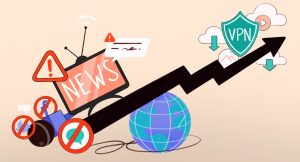
This content is designed for individuals seeking clarity on the necessity of using a Virtual Private Network (VPN) to protect their internet activity. It caters to those who are curious about the privacy and security implications of VPN usage. This article helps readers understand whether a VPN is suitable for their needs and offers alternatives to enhance online privacy.
Debunking the Myths: VPNs and Internet Privacy
In the realm of online security and privacy, Virtual Private Networks (VPNs) have emerged as prominent tools, promising to shield users from prying eyes and secure their internet activities. Yet, as the digital landscape evolves, so do the myths and misconceptions surrounding VPNs’ effectiveness. The question that often arises is whether a VPN is truly essential for safeguarding internet privacy or if alternative methods exist that offer comparable benefits.
VPN Anonymity: The Yes and No
To demystify the notion of VPN anonymity, one must acknowledge that while VPNs can indeed obscure users’ IP addresses and mask their geographical origin, the claim of rendering users entirely anonymous falls short. VPNs excel in enhancing security and privacy, but they are not a cloak of invisibility. It’s vital to recognize that when users remain signed into various services while browsing, the potential for associations with the user’s true identity still exists. This reality underscores the importance of understanding the nuanced role of VPNs in the broader landscape of internet privacy.

The Question of Logging: Transparency and Trust
One of the cornerstones of VPNs’ privacy claims is the commitment to not logging user activity. However, the unsettling truth is that not all VPN companies uphold this commitment to the same degree. Security breaches in the VPN industry, such as the 2018 hacking incident involving a NordVPN server, remind us that vulnerabilities exist even within seemingly secure systems. Trust in VPN providers is paramount, and users should prioritize services that offer transparent policies and undergo third-party audits to validate their no-logs claims.

Situations Demanding a VPN: When to Opt In
The decision to embrace a VPN hinges on understanding the specific scenarios where its usage is prudent. VPNs prove invaluable when users seek to shield their IP addresses from websites or services, allowing them to access content without geographical restrictions. Furthermore, privacy-conscious users find solace in VPNs, preventing ISPs from logging their online activity. However, it’s essential to recognize that a VPN is not a universal panacea. Rather, it’s a tool that serves its purpose in specific contexts.

Exploring Alternatives: Privacy Beyond VPNs
While VPNs have dominated the conversation around internet privacy, alternative methods offer comparable advantages. Secure Domain Name System (DNS) services, for instance, enable users to unblock content and prevent ISP spying. These services provide an additional layer of privacy, ensuring that users’ online activities remain shielded from unwanted surveillance. However, it’s essential to recognize the limits of these alternatives compared to the comprehensive security framework that a VPN can provide.
Conclusion: Navigating the Spectrum of Privacy Solutions
In the intricate tapestry of internet security and privacy, the role of a VPN is both specific and pivotal. It’s not a panacea that guarantees total anonymity, but rather a robust tool that enhances security, shields browsing activity, and offers an array of benefits. The myths surrounding VPNs serve as cautionary tales, urging users to approach these tools with an informed perspective. As we navigate the digital landscape, we must acknowledge that privacy solutions extend beyond VPNs, with secure DNS services standing as a notable alternative. By understanding the strengths and limitations of each approach, users can tailor their internet privacy strategy to their unique needs.










